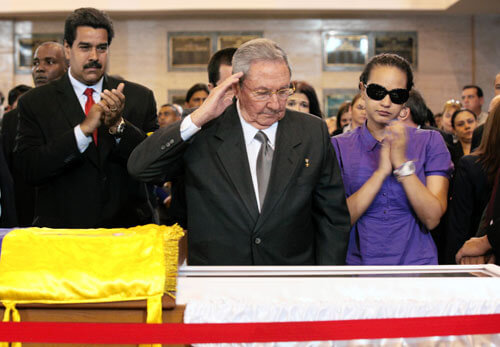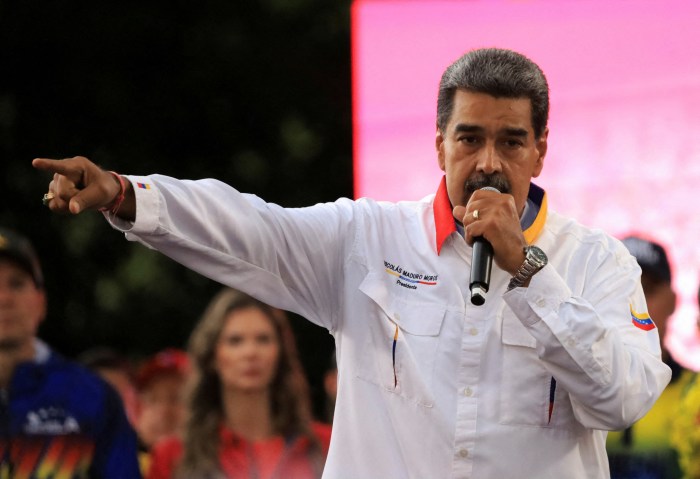CARACAS, Venezuela (AP) — With leaders from five continents on hand, Venezuela began a day of distinctly different ceremonies on Friday — first the formal state funeral of Hugo Chavez, then the swearing-in of his anointed interim successor, which the opposition vowed to boycott on charges it was unconstitutional.
Friday’s funeral at the military academy where Chavez has been lying in state began with Venezuela’s national youth orchestra singing the national anthem, led by famed conductor Gustavo Dudamel. More than 30 political leaders including Cuba’s Raul Castro and Iranian firebrand Mahmoud Ahmadinejad stood at attention before Chavez’s flag-draped coffin.
Outside the academy, the line to see Chavez’s body stretched 1 ½ miles (2 kilometers). Progress for those already waiting since the early hours was halted for the funeral, with some expressing impatience.
Government officials handed out water, and street vendors sold paper replicas of the presidential sash, which many people in the line slipped over their shoulder.
U.S. Rep. Gregory Meeks, a New York Democrat, and former Rep. William Delahunt, a Democrat from Massachusetts, represented the United States, which Chavez often portrayed as a great global evil even as he sent the country billions of dollars in oil each year. Other American VIPs were also expected to be in attendance. The Rev. Jesse Jackson tweeted that he would be there, and television cameras also captured Hollywood star Sean Penn in attendance.
“It is a great pain for us because we have lost a friend,” Ahmadinejad said upon his arrival at the airport overnight. “I feel like I have lost myself, but I am sure that he still lives. Chavez will never die. His spirit and soul live on in each of our hearts.”
Venezuela announced Thursday that it would embalm Chavez’s body and put it on permanent display, a decision that touched off strong passions on both sides of this deeply divided country, which Chavez ruled for 14 years before succumbing to cancer on Tuesday, at the age of 58.
The normally traffic-choked streets of Caracas were empty, with schools and many businesses shuttered. The government also prohibited alcohol sales. Many Venezuelans, particularly Chavez supporters, said they were caught up in the pomp and circumstance of the past few days, and flattered to be the subject of world’s attention.
“This is historic …I have never seen anything like it,” said Edila Ojeda, a 57-year-old janitor. “He was a world leader recognized internationally. I am speechless. It is impressive.”
Others said they were put off by what they saw as excess, particularly the plan to put Chavez’s body on permanent display.
“He was a president, and I would say not a good one. Not a hero,” said Gloria Ocampos, a retired office manager. “He should be buried, just like any other president. They are treating him like he was the father of the country … It’s crazy.”
The government gave national and international media no direct access to the funeral, a measure of the strict control with which Chavez and his top lieutenants have controlled the country for years. On Thursday, Foreign Minister Elias Jaua appealed to local media not to publish critical political analyses “which could be a provocation for a pained people.”
Following the funeral, National Assembly Speaker Diosdado Cabello was to swear in Vice President Nicolas Maduro as interim president, as Chavez desired, despite complaints by the opposition that Cabello is the rightful holder of that post under the constitution. Cabello announced that the swearing-in will be held at the same military academy complex where Chavez’s body is lying in state. Normally, presidents in Venezuela are sworn in at the National Assembly.
In announcing the opposition boycott, spokesman Angel Medina said that Maduro’s ascension is “a violation of the constitutional order.”
“Venezuelans should walk along the path of constitutionality. Today, more than ever we reject that they use the name of the president of the republic, who today is being buried, for political ends,” he said. Critics believe Venezuela’s 1999 charter stipulates that the speaker of the National Assembly take power in the event of a presidential death.
The constitution says elections must be held within 30 days of Chavez’s March 5 death, though the government has not set a date. Maduro has announced he will be the candidate of Chavez’s ruling socialist party against likely opposition candidate Henrique Capriles, and many expect him to ride the wave of emotion following Chavez’s death to victory.
Friday’s funeral promises a climax to three days of ceremony that have followed Chavez’s death, and Venezuelan media were filled with commentary about the outsized place the late leader held on the world stage. Jaua said countries from Cuba to China to Iran had declared days of national mourning for Chavez, highly unusual for the leader of another country.
For many Chavez supporters, and the political insiders he left behind, the task ahead will be continuing the president’s political movement beyond his death.
Maduro announced Thursday that the late president’s body will be embalmed and forever displayed inside a glass tomb at a military museum not far from the presidential palace from which he ruled. Analysts said the perpetual display was meant to keep Chavez’s power structure alive, long after his death at age 58.
“Nicolas Maduro and his government are building an aura that makes it very difficult, I would say, that in the future, the opposition tries to promote an alternative to the government,” said Oscar Valles, a political analyst at the Metropolitan University in Caracas.
Heart-broken supporters were clearly in favor of the effort.
“We must think about the future and how we are going to guarantee the continuity of the revolution,” said Rolando Tarazon, a street vendor who was waiting with his wife to see Chavez’s body lying in state at the military academy late Thursday.
Chavez was particularly beloved by the poor, whose lot he championed. But critics say he left his successors a monumental task, with inflation of more than 20 percent a year, and public debt quadrupling to more than $100 billion. Crime is endemic and Chavez’s chaotic management style has been blamed for a breakdown in infrastructure, particularly in the key oil industry.
Yet for some lined up to see Chavez’s body early Friday, the road ahead meant continuing the late leader’s legacy.
“Chavez, we swear to you, we’ll vote for Maduro!” they chanted.
___
Associated Press writers Fabiola Sanchez, Frank Bajak and Paul Haven contributed to this report.
Copyright 2013 The Associated Press.

AP Photo/Fernando Llano



















